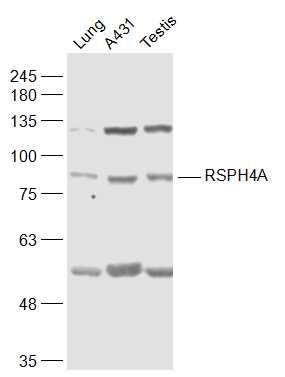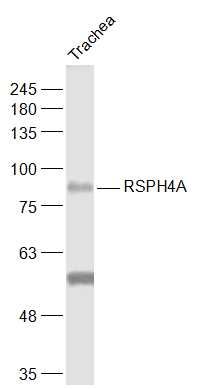RSPH4A Polyclonal Antibody
Purified Rabbit Polyclonal Antibody (Pab)
- 产品详情
- 实验流程
Application
| WB, IHC-P, IHC-F, IF, ICC, E |
|---|---|
| Primary Accession | Q5TD94 |
| Reactivity | Rat, Pig, Dog, Bovine |
| Host | Rabbit |
| Clonality | Polyclonal |
| Calculated MW | 80733 Da |
| Physical State | Liquid |
| Immunogen | KLH conjugated synthetic peptide derived from human RSPH4A/RSHL3 |
| Epitope Specificity | 435-482/716 |
| Isotype | IgG |
| Purity | affinity purified by Protein A |
| Buffer | 0.01M TBS (pH7.4) with 1% BSA, 0.02% Proclin300 and 50% Glycerol. |
| SUBCELLULAR LOCATION | Cytoplasm; cytoskeleton; cilium axoneme. Radial spoke. |
| SIMILARITY | Belongs to the flagellar radial spoke RSP4/6 family. |
| DISEASE | Defects in RSPH4A are the cause of primary ciliary dyskinesia type 11 (CILD11) [MIM:612649]. CILD is an autosomal recessive disorder characterized by axonemal abnormalities of motile cilia. Respiratory infections leading to chronic inflammation and bronchiectasis are recurrent, due to defects in the respiratory cilia; reduced fertility is often observed in male patients due to abnormalities of sperm tails. Half of the patients exhibit situs inversus, due to dysfunction of monocilia at the embryonic node and randomization of left-right body asymmetry. Primary ciliary dyskinesia associated with situs inversus is referred to as Kartagener syndrome. |
| Important Note | This product as supplied is intended for research use only, not for use in human, therapeutic or diagnostic applications. |
| Background Descriptions | RSHL3 is predicted to be a component of the radial spoke head based on homology with proteins in the biflagellate alga Chlamydomonas reinhardtii and other ciliates. RSHL3 (radial spoke head-like protein 3), also known as radial spoke head protein 4 homolog A, is a 716 amino acid protein that belongs to the flagellar radial spoke RSP4/6 family. Mutations in the RSHL3 gene cause primary ciliary dyskinesia 1, a disease arising from dysmotility of motile cilia and sperm. Existing as three alternatively spliced isoforms, the RSHL3 gene contains 6 exons, is conserved in chimpanzee, dog, cow, mouse, rat, chicken, zebrafish, fruit fly and P.falciparum, and maps to human chromosome 6q22.1. |
| Gene ID | 345895 |
|---|---|
| Other Names | Radial spoke head protein 4 homolog A, Radial spoke head-like protein 3, RSPH4A, RSHL3 |
| Target/Specificity | Defects in RSPH4A are the cause of primary ciliary dyskinesia type 11 (CILD11) [MIM:612649]. CILD is an autosomal recessive disorder characterized by axonemal abnormalities of motile cilia. Respiratory infections leading to chronic inflammation and bronchiectasis are recurrent, due to defects in the respiratory cilia; reduced fertility is often observed in male patients due to abnormalities of sperm tails. Half of the patients exhibit situs inversus, due to dysfunction of monocilia at the embryonic node and randomization of left-right body asymmetry. Primary ciliary dyskinesia associated with situs inversus is referred to as Kartagener syndrome. |
| Dilution | WB=1:500-2000,IHC-P=1:100-500,IHC-F=1:100-500,ICC=1:100-500,IF=1:100-500,ELISA=1:5000-10000 |
| Format | 0.01M TBS(pH7.4) with 1% BSA, 0.09% (W/V) sodium azide and 50% Glyce |
| Storage | Store at -20 °C for one year. Avoid repeated freeze/thaw cycles. When reconstituted in sterile pH 7.4 0.01M PBS or diluent of antibody the antibody is stable for at least two weeks at 2-4 °C. |
| Name | RSPH4A |
|---|---|
| Synonyms | RSHL3 |
| Function | Component of the axonemal radial spoke head which plays an important role in ciliary motility (PubMed:19200523). Essential for triplet radial spokes (RS1, RS2 and RS3) head assembly in the motile cilia (By similarity). |
| Cellular Location | Cytoplasm, cytoskeleton, cilium axoneme. Cell projection, cilium |
| Tissue Location | Expressed in trachea, lungs, and testes (PubMed:23993197). Very strong expression is detected in nasal brushings (PubMed:19200523). |
Research Areas
For Research Use Only. Not For Use In Diagnostic Procedures.
Application Protocols
Provided below are standard protocols that you may find useful for product applications.
终于等到您。ABCEPTA(百远生物)抗体产品。
点击下方“我要评价 ”按钮提交您的反馈信息,您的反馈和评价是我们最宝贵的财富之一,
我们将在1-3个工作日内处理您的反馈信息。
如有疑问,联系:0512-88856768 tech-china@abcepta.com.























 癌症的基本特征包括细胞增殖、血管生成、迁移、凋亡逃避机制和细胞永生等。找到癌症发生过程中这些通路的关键标记物和对应的抗体用于检测至关重要。
癌症的基本特征包括细胞增殖、血管生成、迁移、凋亡逃避机制和细胞永生等。找到癌症发生过程中这些通路的关键标记物和对应的抗体用于检测至关重要。 为您推荐一个泛素化位点预测神器——泛素化分析工具,可以为您的蛋白的泛素化位点作出预测和评分。
为您推荐一个泛素化位点预测神器——泛素化分析工具,可以为您的蛋白的泛素化位点作出预测和评分。 细胞自噬受体图形绘图工具为你的蛋白的细胞受体结合位点作出预测和评分,识别结合到自噬通路中的蛋白是非常重要的,便于让我们理解自噬在正常生理、病理过程中的作用,如发育、细胞分化、神经退化性疾病、压力条件下、感染和癌症。
细胞自噬受体图形绘图工具为你的蛋白的细胞受体结合位点作出预测和评分,识别结合到自噬通路中的蛋白是非常重要的,便于让我们理解自噬在正常生理、病理过程中的作用,如发育、细胞分化、神经退化性疾病、压力条件下、感染和癌症。







